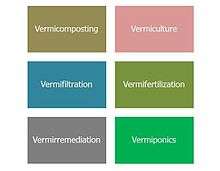Vermitechnology
Vermitechnology is the science that studies the importance of several Epigenic earthworms species to solve the environmental problems in society and ecossistems. It is a branch of Environmental engineering and Ecological engineering. Vermitechnology is mainly on organic waste management, wastewater treatment and organic farming. Other targets include sustainability, decontamination, toxicology and biology.

Charles Darwin, the father of the theory of "Evolution of Species", dedicated more than 40 years of his life to the study of earthworms, and was the first to demonstrate its role in Nature through the book "The formation of humus through the action of earthworms", published in 1881.
Vermicomposting
Vermicomposting is a technology and a controlled treatment process – including the reduction in weight and volume - of the organic fraction of the waste streams, and using for the process different species of epigeal earthworms, making their pollutant and contaminant degree unfeasible, producing at the same time organic factors of production. In this biooxidative process, earthworms interact with microorganisms and decomposing fauna, affecting positive and significantly the waste treatment rates, largely due to changes in their chemical, physical and microbiological properties. Vermicompost is the most important by-product obtained, even if vermicompost leachate and vermicompost extracts are also important.
Vermiculture
In vermiculture, it is possible to produce earthworm biomass, normally to supply other vermicomposting processes, as a source of protein for animal feed, or for fishing purposes as bait. The main objective is to increase existing populations of earthworms per unit of time, so, during the process, low earthworm densities are used. With a less rate than vermicomposting, vermicompost is also a by-product of the process.
Vermifiltration
Vermifiltration contributes to raw wastewater treatment using species of epigeous earthworms in a biological filter. The process reduces organic matter, increase mineral nutrients and eliminates pathogens and helminth eggs in wastewater. It can work as primary, secondary and tertiary treatment however, in wastewater treatment, is frequentlly recognized as a secondary treatment technology. The treated wastewater can be used for agriculture irrigation, contributing to reduce water scarcity.
Vermifertilization
Vermifertilization is definied as the use of vermicomposting and vermiculture by-products - vermicompost, vermicompost leachate and vermicompost extract, for crop production, based into a organic and sustainable perspective way. The process requires the knowledge of each crop nutrient demand, crop type, soil composition and characteristics, soil topography, evapotranspiration and equipment available.
Vermiponics
Vermiponics is a mix of hydroponics and organic farming. In the process, crops are growed using organic products produced during the process or stored from vermicomposting of vermiculture processes. Crop production is made without typical soil but also with or without vermicompost as growing substrate. Typical growing substrates include sand, clay, stones, coconut fiber of peat. When using vermicompost as growing substrate, the leachate of this same vermicompost is used as an organic nutrient solution.
Vermirremediation
Vermirremediation studies the ecovery of soil or contaminated substrates with heavy metals, organic pollutamts or pathogens, using vermicompost and earthworms. Since vermicompost as a high contend of organic matter and humic substances, it can fix on it high concentration of trace elements, mainly organic contaminants. As for earthworms, they are abble to accumulate high concentrations of chemicals into their biomass, working as bioremediators.
See also
- Vermicompost
- Vermidigester
- Vermifiltration
- Vermifilter
- Organic farming
- Earthworms
- Sewage sludge
- Environmental engineering
- Ecological engineering